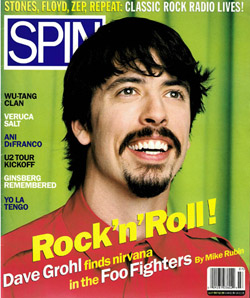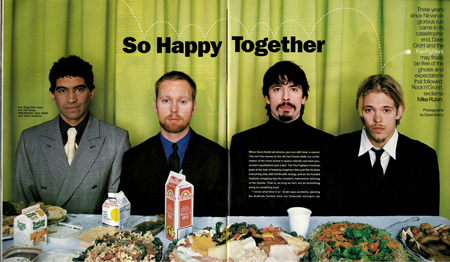
A similar sense of exuberance pervades the Foos' musical offerings. Grohl's delicate vocals glide over thick, crunchy guitars without the weight sonically and subtextually-that has become associated with the "N word" and the "G things." Tracks like "My Poor Brain," "Up in Arms," and "Enough Space" still employ the quiet-verse/loud-chorus dynamic that Nirvana helped craft into gold sounds and platinum breaks-on "New Way Home," Grohl's voice leaps quite literally from a whisper to a scream-but Grohl's songwriting relies less on Prozac than adrenaline; Foo tunes are more hummers than bummers. "This band is relatively free of drama; it's just a totally different scenario," says Grohl. "Nirvana was nuts, it was crazy. I made my way through all of that other bullshit, and now I'm back to square one. That feels nice." Is it simply his status as bandleader, I ask Grohl, that makes the difference in his demeanor? "I think it's the subtraction of drama," he replies. "The Foo Fighters are a bunch of boring people, we really are. With Nirvana there was always something up someone's sleeve." He pauses for a moment, playing back his last comment in his head, then starts to laugh. "That was horrible," he chuckles incredulously, shaking his head. "I can't believe I just said that." Dave Grohl is a very private guy in a very public circus, so it's ironic that his choice for our lunch locale is the restaurant at the Chateau Marmont hotel in Hollywood, a setting with its own subtext of tragedy and loss. John Belushi fixed up his lethal speedball in bungalow 3, while songwriters Barry Mann and Cynthia Weil penned the Righteous Brothers' hit "You've Lost That Lovin' Feelin'" in room 2H. The 28-year-old Grohl has found his own lovin' feelin' once more-he's currently romantically linked to Veruca Salt guitarist Louise Post, whom he met when the two collaborated on a couple of songs for Grohl's soundtrack to the Paul Schrader flop Touch. Despite the Hollywood Babylon backdrop, Grohl is painfully wary of becoming another bold-faced name in the gossip columns. He's experienced firsthand what happens when hard rock becomes Hard Copy, when Andy Rooney starts sifting through your bandmate's personal effects. After Nirvana, he's ultrasensitive about turning his life into the kind of tabloid fare Courtney Love, who he helped introduce to Kurt Cobain, has become infamous for. When it came time to do interviews for the Foos' first album, in fact, Grohl chose to let the record do the talking for him. Which turned out to be a bit of a problem, since Grohl's lyrical approach can be summed up in a line from the Foos' first-ever single, "This Is a Call": "Riddling is easy, riddling is good." Well, okay, except it turns out that Grohl was really singing about the drug given to hyperactive children, 'Ritalin is easy, Ritalin is good," so go figure. Sometimes it's tougher than leather to understand exactly what Grohl is saying, and not even his bandmates know for sure: Hawkins admits he never could make out a word of "This Is a Call," and thinks the line "Don't want to be your monkey wrench" in Colour's "Monkey Wrench" is "Don't want to be your huggy bear," while Smear thinks "One more indecent accident" is "Want War and Peace an accident." For the record, I tell Grohl that I misheard "I'd rather leave than suffer this" as "I'd rather be your circumflex." "Yeah," he cracks, "then I guess 'What do you do when all your enemies are friends?' would be 'What do you do when all your enemies are French?'" Qu'est-ce que ce, Dave? "It was nonsense," confesses Grohl of many of the lyrics on the Foos' self-titled 1995 debut, on which in Prince-like fashion he played every instrument (save one Greg Dulli guitar solo). "It was for fear of writing something that might reveal too much, or actually reveal something at all. I've come to the conclusion that it's so much more difficult to write lyrics that are meaningless, because the first thing that happens when you sit down to write is you start spilling emotions, and whatever is hidden inside you is going to make its way out. I don't want to let everyone else in on my problems or my personal crisis or my misery. They're mine." Grohl is much prouder of his wordplay on the new album (the first to feature the musical contributions of other Foo Fighters), even including a lyric sheet this time around, though the songs still provide few clues to his inner workings despite the fact that his three-year-old marriage to photographer Jennifer Youngblood was unraveling as he penned them. On "New Way Home" he declares, "I'll never tell you the secrets I'm holding," and during our conversation that list of taboo topics includes:
Whether the scalding commentary of "I'll Stick Around" - with lines like "how could it be I'm the only one who sees your rehearsed insanity" and "I've been around all the pawns you've gagged and bound"-is directed, as is widely assumed, at Courtney Love: "I don't want to say; leave that to speculation. [Giggles, long pause] It's not about Kurt, that's for sure."
His impending divorce: "I don't want to get into it too much. [Looks off into distance, sighs] It sucks."
His relationship with Post: "Hmmm." [Shakes head, stares straight ahead, long pause] "That's a big no-no; next question."
What he thinks of bands shamelessly ripping off Nirvana's sound: "[Taps feet, long pause] I. don't like to slag,* but I feel very passionately about it. [Smiles, shrugs] I could really fucking go off. [Laughs heartily] You know who I mean!"
And whether scruffy Johnny Depp manque Skeet Ulrich was an influence on his current goateed look: "Shut the fuck up. [Laughs] Good Lord." One matter Grohl will discuss, albeit gingerly, is the recent departure of drummer William Goldsmith. After a couple months of difficult recording sessions for Colour, Goldsmith-formerly Mendel's rhythm-section battery mate with the Sub Pop band Sunny Day Real Estate-left the Foos after Grohl rerecorded his drum parts on the album. "Will decided that he wanted to play with other people and not go on the road and tour for this record," states Grohl diplomatically. "It was kind of sad." "There's no weird animosity or anything, I basically just wasn't happy is what it comes down to," explains Goldsmith, who admits to some tension over having two drummers in one group. "It got on my nerves, as far as expectations and that kind of thing. It seemed like a lot of people wanted me to be him and I would rather be me." Fortunately for the Foos, Goldsmith's replacement, Taylor Hawkins, was easy to find. Grohl had struck up a friendship with Hawkins when the two had met last year in Europe, where Taylor was drumming in Alanis Morissette's backing band. The Foos had auditioned two other drummers before Grohl called Hawkins to ask him for recommendations, only to find out he was available. "If I was to not know Taylor and go see his band play in a club, I would approach him after the show and say, 'How much do you charge for lessons?'" enthuses Grohl. "He's 50,000 times a better drummer than me."
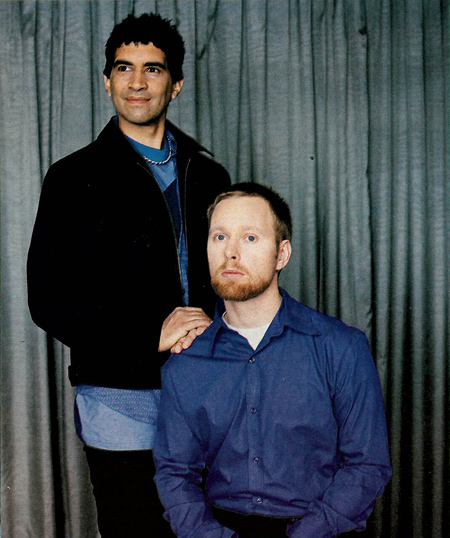
Forget Dolly the Sheep: Hawkins seems like he's a clone of Grohl, only three years younger. With his mop of dirty-blond hair and goatee, Hawkins is looking kind of Skeet-like himself, and he's as skinny, antic, and hyperkinetic as Dave, maybe even more so. "I can't wait to go on tour so I can see if Taylor ever sleeps," laughs Grohl. Besides the ability to play like John Bonham, Stephen Perkins, or his idol, Stewart Copeland, Hawkins brings his own, surfer-influenced dialect to the Foo mix: a sample glossary includes "winger" (complainer), "Hessian" (hick, redneck, unsophisticated, burnout), and "flobe" ("when you fuck something up," says Hawkins, "like, if you've floundered, you're a flobe"). "He's the whitest Southern California surf kid I know," opines Smear. Hailing from Laguna Beach, about 50 miles south of L.A. in Orange County, Hawkins just spent a year and nine months of constant touring in Morissette's backing band, which offered excellent preparation for the Foos' six hours of nightly rehearsal overseen by General Grohl. "You have to be an athlete to play these drum parts," says Hawkins. "I play really hard, and that's the key to playing drums for Dave Grohl-you've got to beat the shit out of the drums." Grohl himself got a late start at his brutal, ferocious thudding, since he never owned a drum set as a child; his family couldn't afford one. He didn't get his own kit until he was in his third band, couldn't figure out how to build the high hat stand until he was in the Washington, D.C. hardcore outfit Scream, and still can't tune his drums. Grohl learned to play drums on his bed in the D.C. suburb of Springfield, Virginia, using a chair as the high hat, a pillow on the floor as the snare, and the bed as the toms, hammering along with fat, heavy marching sticks to such high-velocity fare as Minor Threat and the Bad Brains on the Fairfax County Public Schools-issue record player that his single mom brought home from her job as an English teacher. "That's why I started hitting the drums so hard," explains Grohl, "playing on pillows, pushing down and pulling up with these fucking bats listening to 'Violent Pacification' by D.R.I. I'd do that until the windows in my bedroom were dripping with condensation from the sweat in the room. It was like a workout tape." In high school, Dave played in a series of groups-Freak Baby, Mission Impossible, and Dain Bramage-performing on bills with bands like Minor Threat, Trouble Funk, and the Melvins before getting the chance to become a member of Scream, one of his absolute favorites. It wasn't long before Grohl dropped out at 17 to tour full-time, and he remained with Scream until they broke up in July 1990. In the process, Grohl learned the fine art of stretching $7 a day on tour to cover food, cigarettes, and pot. "It was the best education," says Grohl. "If you were to sit me down in a classroom, with fluorescent lights humming and some woman trying to teach me Italian, there's no way. But Scream goes to Italy, we stay in a squat, and the only way you can ask someone where to take a piss is to do it in Italian. So I learned Italian." When Scream's bassist bailed on them in L.A., leaving them stranded and broke, Dave called the Melvins' Buzz Osborne, who brokered Grohl's move to Seattle in September 1990 to join Nirvana. Although Grohl had been writing songs, there wasn't much opportunity to use them in his new band. "When you're in a band like Nirvana and the songwriter is someone like Kurt, you try to step back and not pollute the process. Don't fix it if it ain't broke." Despite being at the helm of the Foos' success, Grohl acknowledges that "I'll probably be forever known as 'that guy who played drums in Nirvana.' You can think of it two ways: Like the kid who was caught masturbating in the bathroom in high school and for the rest of his high school career he was the kid who was caught masturbating in the bathroom no matter what he did. Or you can be proud of it. And I'm proud of it. I am." It's a few weeks after what would have been Cobain's 30th birthday, and a few weeks before the third anniversary of his death. So despite Grohl's demonstrated reticence, later that evening, as we continue our discussion at the hotel, I ask him how he planned to mark the upcoming milestone. "Believe me," he sighs, "I realize that it's the three-year anniversary." He pulls at his mustache and averts his eyes from mine. I'm left staring at the tape recorder. How often does Kurt cross your mind? I finally ask. "Always. A lot. Daily. In dreams." When was the last time you thought of him? "Six nights ago, in a dream," he answers, his voice tinged with resignation. "It's hard not to think about something that everybody wants to talk about all the time." Grohl lights up a cigarette, then runs his fingers along the tattoo of Led Zeppelin drummer John Bonham's personal rune on his right forearm and gazes out into the cool California night. "You're dealt a hand," he says finally, exhaling a puff of smoke, "and you just have to deal with it."
&mnsp Sixty degrees Fahrenheit is a little chilly for poolside banter, but at least the sun is shining down on Pat Smear's face. We're lounging in the backyard of the Playboy Mansion near Beverly Hills as Smear tapes a segment for MTV's House of Style swimsuit show, and HoS's newest roving correspondent is attired appropriately for his surroundings, if not the current climate: He's sporting a bright red silk robe with tiny blue polka dots (and a $1,500 price tag still attached), a blue ascot, black slippers with a gold dragon on the toes, and-of course-the requisite pipe.
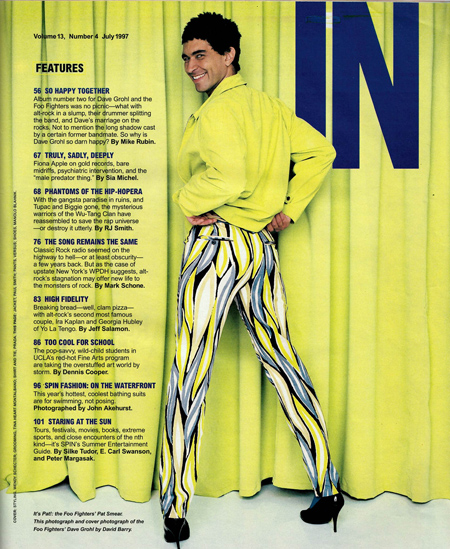 A painful-looking rug burn on Smear's knee pokes out from under his robe as he reclines on an aqua green chair next to the snakelike pool and interviews a succession of former Playmates, tossing them questions seemingly torn straight from the questionnaire underneath the centerfold staple. Never mind Cindy-It's Pat!:
Pat: "What month were you?"
A painful-looking rug burn on Smear's knee pokes out from under his robe as he reclines on an aqua green chair next to the snakelike pool and interviews a succession of former Playmates, tossing them questions seemingly torn straight from the questionnaire underneath the centerfold staple. Never mind Cindy-It's Pat!:
Pat: "What month were you?"Jessica Lee: "Miss August 1996."
Pat: "That's my birthday! ... What are your turn-offs?"
Jessica Lee: "Stinky guys."
Pat: "No comment!... Words to live by?"
Jessica Lee: "I don't know."
Pat: "You hate me ... What's your typical day?"
Jessica Lee: "Hanging out."
Pat: "What are you wild about?"
Jessica Lee: "Shopping and spending money."
Pat: "You lead the life of exactly how I thought a Playmate lives!" After the poolside chats Smear is introduced to Ava Fabian, Miss August 1986, who is dressed in white pants and an orange shirt that fits so tight you can see her, uh, ventricles. Fabian holds Smear's hand as she leads him on a tour through the Mansion grounds, with the camera crew scurrying quickly behind them. They put coins in a wishing well, stroll past the tennis courts, step over Hugh M. Hefner's star from the Hollywood Walk of Fame, and arrive at the game room, where Fabian points out her picture on the backglass of the 35th Anniversary Playboy pinball machine. The tour concludes with Fabian and Smear venturing inside a 30-foot-high cage full of squirrel monkeys in the corner of the backyard, just past a dazzling array of macaws, flamingos, cranes, peacocks, and other exotic birds roaming freely amidst a lurid expanse of flowers and foliage. It's a remarkable sight, but Smear is blase about the view; this isn't the first time he's been to the Playboy grounds. Years ago, he applied for a job here taking care of the birds in the aviary, though he didn't get hired. "Fuckers," he hisses. "My whole life would have been different." Actually, Smear's whole life has been different. It may have taken him a while to get the prime-time vehicle that he deserves, but he's been ready for his close-up for almost 20 years now; it's the rest of us who've been slow on the zoom lens. "He's just a star," says Grohl. "There are people that somehow become stars whether the world loves them or not." Born Georg Ruthenberg jn Los Angeles roughly 37 years ago, Pat grew up in West L.A., the son of a German immigrant father who was an inventor and photographer-Smear's grandmother baked cookies for Hitler, Smear claims-and a foreign-language teacher/opera singer mother of African-American and Cherokee extraction. "I'm a mixture of the most oppressive people and the most oppressed," he jokes. When Georg was in 7th grade he met 8th grader Jan Paul Beahm through a mutual speed dealer, and the two eventually discovered they shared an affinity for Queen and David Bowie. When Ruthenberg returned home after running away at 13 to join a "Jesus commune" for a year, the two friends became classmates at University High's alternative ed program, although they spent most of their time pursuing such extracurricular as stalking Queen whenever that band was in town. It was in the act of chasing Freddie Mercury up the elevator at the Beverly Hilton, in fact, that the pair met future Go-Go Belinda Carlisle, who would soon become the drummer in an embryonic lineup of the Germs. In the Hollywood dream factory, where identity and image are fluid, punk was an equal-opportunity employer, which meant not only that anyone could form a band-even if they couldn't play a lick, like the Germs-but that alienated teens could mimic the show-biz Ellis Island effect that had turned previous drama queens like Theodosia Goodman and Norma Jean Baker into "Theda Bara" and "Marilyn Monroe." Thus purported vocalist Beahm became "Bobby Pyn," and ultimately, "Darby Crash," while fledgling guitarist Georg was reborn as "Pat Smear." "I was in health class, 11th grade, and I read about Pap smears and I thought that was the most disgusting thing I could imagine." Initially more of a gang than an actual band, the Germs eventually learned to handle their instruments, recording the L.A. scene's first single in 1977 and first album, (Gl), in 1979, which remains one of the most vital documents of American punk. Unfortunately, what most people remember the Germs for today isn't Smear's dynamic fretwork but the shock theatrics of Crash, whose tightrope walk on the edge of madness many punks have tried since to imitate. The self-proclaimed "Annihilation Man," Crash killed himself by deliberately fixing up a heroin OD, reportedly in tribute to Sid Vicious, on December 7, 1980; the murder of John Lennon the next day deprived Crash of whatever coverage his passing might have garnered. "The Germs' contribution to history sucks as far as I'm concerned," says Smear of his Germ-spree adolescence. "It's about somebody committing suicide and becoming a legend because of it, and that's disgusting. I think it's sad that somebody had to be so sad to become a legend." With the Germs an unpleasant memory for him, except for having met his girlfriend Jena at the band's second show-the couple are still together after almost 20 years-the dawn of the '80s found Smear on food stamps. He continued playing guitar on and off (with bands like Vagina Dentata, 45 Grave, and Twisted Roots) and put out two solo albums, but had to fight off poverty by doing phone sales, working as a receptionist at a modeling agency, and serving as a Hollywood punk rock extra. Wherever an offbeat-looking presence was needed, there was Smear: from Blade Runner to Howard the Duck, from CHiPs to Prince's "Raspberry Beret" video ("I'm all over that one, with really bad hair"). It was on the set of the breakdancexploitation flick Breakin' that Smear met fellow extra Courtney Love, who soon became one of his closest friends. "I just remember running home afterwards and telling Jena, 'I met the most amazing girl! Everybody hates her and I love her to death!'" By the turn of the '90s Smear was working part-time as a clerk at the SST Records retail outlet, where he was immortalized, or something, when Sonic Youth used his name as the chorus of their song "Screaming Skull." In 1993 he passed on Flea's invitation to replace John Frusciante in the Red Hot Chili Peppers, but when Courtney's husband called a few months later with an invitation to join Nirvana, Smear was all ears and no apologies. Smear actually had an "ESP thing" that Cobain would call and offer him a job. "I had been trying to figure out a way to get a hold of him to tell him I wanted to be the second guitar player, and before I had a chance he called me." "I expected him to be this bitter old junkie from the crazy SST scene," says Grohl of his first meeting with Smear upon Pat's arrival in Seattle, "but it was 180 degrees the other direction. I felt like he saved the band when he started playing with Nirvana. He walked into the room and it just lit up, and Nirvana practices never lit up like that." Smear is still able to liven up any room he's in, yet the flamboyant extrovert is also exceedingly shy. Smear's had a lifelong reluctance to being interviewed-his most memorable line in 1980's L.A. punk scene documentary The Decline of Western Civilization was sneering "Is the time up now?" at the camera-but despite his inexperience, his HoS on-air persona reveals that he's a natural at the interrogation process. "Interviewing is fun," he explains. "You get to learn things about people other than yourself. When you're being interviewed, you're talking about things you've already lived. I've already done that, so what fun is that?" Despite his bashfulness, Smear is a wild card on camera, and has become as ubiquitous on MTV as videos used to be: One day he can be spotted making out with Kelsey Grammer during a poker game on Rodman World Tour, while another he's covering the Oscar nominations for MTV News dressed in a woman's business suit to look like an L.A. TV newscaster. Smear turned a guest appearance on House of Style cavorting with Amber Valetta and Shalom Harlow into a regular gig as a creative consultant, and he now appears monthly to take the Spice Girls shopping at Contempo Casuals or receive prom etiquette tips alongside his "date" Kurt Loder."He's funny, he's a smart-ass, and he's got amazing style," says Alisa Bellettini, executive producer of House of Style. "His sense of cool is just a little different than everybody else's, so it works perfectly for us."
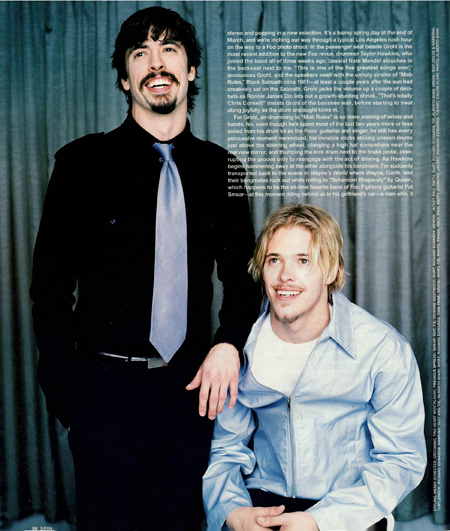
Absolutely fabulous, Smear is dancing." He'd rather dish than mosh, and he's fond of wearing women's clothes, especially high heels, miniskirts, and accessories. "I've always liked to dress up," he confesses. "I'd choose a halter top over a Led Zeppelin T-shirt when I was in high school. I've always been attracted to the gayish side of fashion. It's just more interesting."When shooting finally wraps at the Mansion, Smear changes back to his own clothes-no miniskirt today, just a T-shirt with daisies on it, sky blue trousers, and a pair of boots from the 70s with the Playboy rabbit logo stamped on them, worn especially for the occasion. Alas, it turns out that Smear's performance "It's important to break out from behind the dunce throne they call the drum set and do things that are challenging," says Grohl. MTV's coolest on-air personality, and perhaps the most camp presence on television since Paul Lynde. Smear's penchant for cross-dressing, his post-queer patois, and his playfully swishy manner have confused some quarters into reporting that he's homosexual. An L.A. gay weekly even matter-of-factly referred to him as a "gay guitarist." Well, they got the "guitarist" part right. "I don't care" shrugs Smear when I ask him about being "outed." "I've been called a fag all my life. I learned what the word 'fag' meant when I was called one when I was 12. That's the difference between being famous and not being famous: now people yell 'Pat!' out the window, where they used to yell out 'Fag!' and it doesn't even sound that much different." "Isn't it incredible?" marvels Smear, packing up his stuff after eight long hours of impersonating Oprah. "The ultimate fantasy job interviewing Playmates in their bathing suits at the Mansion-and it's still incredibly boring! Who could believe it?"
"It's important to break out from behind the fucking dunce throne they call the drum set and do things that are challenging." Dave Grohl, no dunce he, is referring to his soundtrack for Touch-which starred Dave doppelganger Ulrich-but he could just as well be talking about his hands-on involvement in all things Foo, including his bow as a video director with the clip for "Monkey Wrench," the bracing first single off Colour. Grohl has always monkeyed around with his own video camera, making silly short films whenever he's bored on tour and alone in his hotel room, but this is his first official stint handling the mise-en-scene.
Right now, however, on the second afternoon of a two-day shoot at a Culver City soundstage, there's very little mise and not much scene. The high point thus far has been killing time watching Hawkins' spot-on impersonations of various bass-playing styles (the John Deacon-type '70s session player, the Sid Vicious-like aggressive punk, the Level 42-British funk guy, and even Mendel, who sat completely oblivious a few feet away, reading Don Quixote), while Grohl's directing has mostly consisted of rounding up the wandering Foos. Finally, after hours and hours of sitting around leafing through magazines-"Here's my co-worker!" exclaims Smear at one point, holding up a Cindy Crawford Revlon ad-the band gets the call to "play" in the "apartment" set, a tiny room painted a glaring shade of crimson. As a tape of "Monkey Wrench" blasts across the soundstage, the band pick up their instruments and commence "rocking out." Mendel rolls his head on his shoulders in a trance-like state, while Hawkins tosses his mop of hair frenetically from side to side, obscuring his infectious grin behind a bottle-blond blur. Smear hops up and down in his high heels, vamping for the camera in a skintight black velvet ensemble while throwing punches at his six-string in a matching pair of black velvet elbow-length gloves. Grohl is an even bigger ham than Smear, jumping in the air, kicking up his feet Pete Townshend-style, falling to his knees, playing the guitar between his legs, and opening his mouth so wide that the camera can see his tonsils. Watching from the next room, I can hardly tell that Grohl is lip-synching-the pantomiming is delivered with the ecstatic sincerity of a teenager playing air-guitar riffs in front of a full-length mirror. Or, say, an ex-drummer beating the dash to Black Sabbath in his Chevy mini-van. "I've covered a lot of ground," Grohl readily admits, flashing an impish grin, "but I still feel like a pathetic 17-year-old dropout. My spirit is still young." Words: Mike Rubin Pics: David Barry
